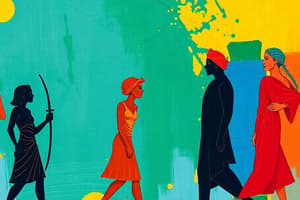Podcast
Questions and Answers
ଇତିହାସ କିଏ ମାନେ?
ଇତିହାସ କିଏ ମାନେ?
- ସ୍ୱ ସ ସ
- ସ୍ୱେଡେନ ଏ ସ୍ଥାନ
- ସ୍ୱେଜ ସ ସ୍ଥାନ
- ମାନବ ଅଭିଭୂତି ଏ ସ୍ଥାନ (correct)
ଇତିହାସ କେବେ ଏକ ସ୍ପଷ୍ଟ କଥା ନୁହେ, ପ୍ରଥମେ ଏହା କୁଣ ସ୍ପଷ୍ଟ ସ୍ଥାନ୍ତ୍ର ସ ସ୍ଯ ପୂର ସ,?
ଇତିହାସ କେବେ ଏକ ସ୍ପଷ୍ଟ କଥା ନୁହେ, ପ୍ରଥମେ ଏହା କୁଣ ସ୍ପଷ୍ଟ ସ୍ଥାନ୍ତ୍ର ସ ସ୍ଯ ପୂର ସ,?
- Age of Discovery (correct)
- The Enlightenment
- The French Revolution
- The Cold War
�, �, �� �? �� ?, ' �, _� _� ' , _� �. , ?
�, �, �� �? �� ?, ' �, _� _� ' , _� �. , ?
- _� '
- _� ?
- ' _� _� (correct)
- , _�
ଇନ୍ଡସ୍ ଭାଲେ ସଭ୍ୟତା କଣ ମୂଳ ଚିହ୍ନ ମଧ୍ୟ ସେ?
ଇନ୍ଡସ୍ ଭାଲେ ସଭ୍ୟତା କଣ ମୂଳ ଚିହ୍ନ ମଧ୍ୟ ସେ?
ଇନ୍.. . ପ.. . ... . ସ .. . . ... .. . . .. . . . ସ ସ.?
ଇନ୍.. . ପ.. . ... . ସ .. . . ... .. . . .. . . . ସ ସ.?
ଇ.. . .. ... . ... . .. .. . .. .. .. . . .. .?
ଇ.. . .. ... . ... . .. .. . .. .. .. . . .. .?
Maurya Empire ସ.. . . .. .. . ..?
Maurya Empire ସ.. . . .. .. . ..?
Delhi Sultanate ସ.. . .. .. . .. .. ... ?
Delhi Sultanate ସ.. . .. .. . .. .. ... ?
Gupta Empire ସ. . . ... . .?
Gupta Empire ସ. . . ... . .?
ଇତିହାସ କିଏ ମାନେ?
ଇତିହାସ କିଏ ମାନେ?
ଗুপ্ত ସাম্রাজ্য ସম্প্রদায়িক প্রশাসন প্রণালি କ�,?
ଗুপ্ত ସাম্রাজ্য ସম্প্রদায়িক প্রশাসন প্রণালি କ�,?
'୨�� ��_ �� �� �� �� ��_�' ସ ସ�?
'୨�� ��_ �� �� �� �� ��_�' ସ ସ�?
'��� �� � ��_ �� _ �� �, ��_� ��' ସ ସ�?
'��� �� � ��_ �� _ �� �, ��_� ��' ସ ସ�?
'��_ �, ��_ _ , �� ?' �� �� �� ��?
'��_ �, ��_ _ , �� ?' �� �� �� ��?
'�� �_ �_ _ _' ��, ��� ��� ?
'�� �_ �_ _ _' ��, ��� ��� ?
Study Notes
Uncovering the Past: An Overview of History
History is a vast and intricate tapestry woven from the threads of human experiences, chronicling the trials, triumphs, and transformations of our species. From the ancient civilizations that laid the foundations of modern society to the tumultuous events that continue to shape our world, history serves as a testament to our shared heritage.
The Scope of History
History encompasses a vast array of subjects, each offering its own unique perspective on humanity's evolution. At its core, history is the study of change over time, with scholars delving into the past to understand the forces that have shaped our world. From the rise and fall of empires to the tumultuous journeys of ordinary people, history provides a rich and diverse narrative of our collective past.
The Chronology of History
History is often divided into periods, with each era defined by its unique characteristics.
- Prehistory - The earliest traces of human activity, dating back millions of years, marked by the discovery of tools, art, and the emergence of human civilization.
- Ancient History - The period that began with the invention of writing and encompasses some of the world's oldest civilizations, including the Sumerians, Egyptians, and Greeks, culminating in the rise of Rome.
- Medieval History - A period of great change, marked by the decline of the Roman Empire and the rise of Christianity, as well as the beginnings of the Renaissance.
- Early Modern History - A time of exploration, trade, and the spread of ideas, characterized by the Age of Discovery and the Enlightenment.
- Contemporary History - The period from the French Revolution to the present day, encompassing the rise of democracy, the two world wars, the Cold War, and the globalization of our world.
The Role of Perspective in History
History is not a single, definitive narrative; rather, it is a collection of perspectives, each offering a unique lens through which to view the past. As the field of history has evolved, scholars have embraced a more nuanced approach, recognizing the complexities and ambiguities inherent in the study of human experiences.
- Cultural History - An approach that focuses on the unique cultural achievements and contributions of different societies, exploring the interplay between culture, religion, and politics.
- Social History - A perspective that emphasizes the lives and experiences of ordinary people, shedding light on the everyday realities of the past.
- Economic History - An approach that examines changes in the production, distribution, and consumption of goods and services, as well as the impact of economic forces on society.
- Military History - A perspective that focuses on the strategies, tactics, and technology of warfare, as well as the broader political and social implications of armed conflict.
The Importance of History
History provides a unique lens through which to view the world, offering valuable insights into the human condition and our collective past. By studying history, we can better understand the complexities of our world, illuminating the challenges and opportunities that lie ahead.
- Learning from the Past - History teaches us about the trials and tribulations that have shaped our world, providing valuable lessons about the consequences of our actions.
- Understanding Complexity - History helps us to see the world through a more nuanced lens, illuminating the complexities and ambiguities inherent in the human experience.
- Celebrating Diversity - History highlights the unique contributions of different societies, cultures, and individuals, fostering a deeper appreciation for the rich tapestry of human experience.
- Inspiring Creativity - History provides an endless source of inspiration, motivating us to create, innovate, and push the boundaries of human achievement.
Conclusion
History is a vast and intricate tapestry, woven from the threads of human experiences. By delving into the past, we can better understand the complexities of our world, illuminating the challenges and opportunities that lie ahead. From the earliest traces of human activity to the contemporary issues of our world, history provides a unique lens through which to view the human condition, fostering a deeper appreciation for the rich tapestry of human experience.
Studying That Suits You
Use AI to generate personalized quizzes and flashcards to suit your learning preferences.
Description
Explore the vast tapestry of human experiences and the evolution of societies through the lens of history. Delve into the chronology, perspectives, and significance of historical events to gain valuable insights into the complexities of our world.




